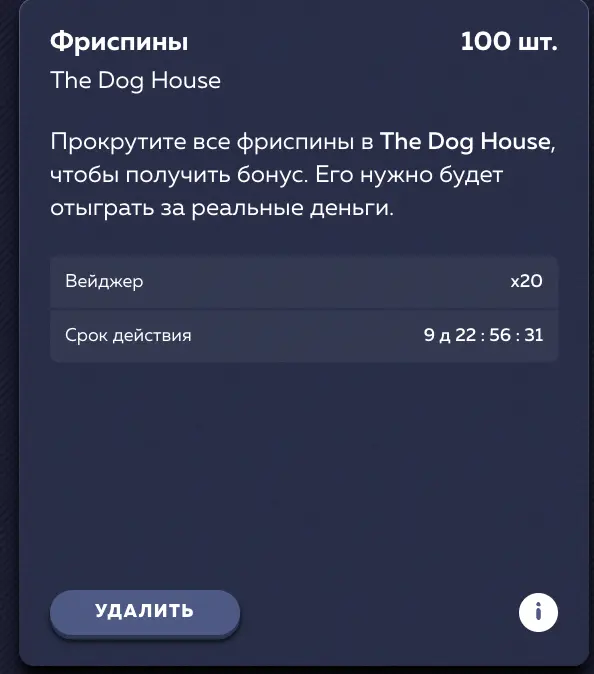Вавада казино (рабочее зеркало Vavada)
Вавада — это онлайн казино, которое быстро завоевало популярность среди любителей азартных развлечений в СНГ благодаря адаптации под местный рынок, квалифицированной поддержке и солидному каталогу, включающему игровые автоматы, ставки на спорт и регулярные турниры. Площадка имеет лицензию, выданную авторитетным регулятором Кюрасао, что гарантирует безопасность и честность всех игр.

Преимущества проекта:
-
более 5300 автоматов от топовых провайдеров;
-
регулярные промоакции и щедрые бонусы для новых и постоянных гемблеров;
-
десятки методов оплаты, включая карты банков и криптовалютные переводы;
-
круглосуточная поддержка на разных языках.
Дизайн официального сайта Vavada выполнен в современном стиле с интуитивно понятным интерфейсом. Яркие цвета и качественная графика создают атмосферу праздника и азартного настроения, а продуманная структура помогает быстро находить нужные функции и разделы.
| Год запуска | 2017 |
|---|---|
| Лицензия | Curacao eGaming |
| Разделы | Слоты, crash-games, турниры, ставки на спорт |
| Платежные способы | 20+ |
| Поддерживаемые языки | Русский, английский, казахский, немецкий и пр. |
Отличия от мошенников
В интернете существует множество нелегальных игорных площадок, которые маскируются под честные заведения, но на деле обманывают игроков. Казино Вавада принципиально отличается от мошеннических проектов по целому ряду признаков, которые легко проверить.
-
Действующая лицензия с проверяемыми данными. Подлинность документа оценивается через сайт регулятора. Информация лицензиата должны совпадать с теми, что указаны в открытом доступе.
-
Прозрачные правила и публичная отчетность. Легитимные клубы открыто публикуют все правила, условия вознаграждений и требования по отыгрышу. Мошенники часто скрывают важную информацию или пишут требования мелким шрифтом с множеством «подводных камней».
-
Сертифицированные игры от известных разработчиков. Все слоты в Vavada поставляются напрямую от лицензированных провайдеров. Злоумышленники часто используют пиратские версии видеослотов с измененным алгоритмом или вообще создают подделки. Как отличить: логотип провайдера кликабелен и ведет на официальный сайт разработчика.
-
Реальная служба поддержки 24/7. В легитимном заведении саппорт отвечает на вопросы в режиме реального времени. Скаммеры либо не имеют поддержки вообще, либо предлагают только email с ответами через несколько дней.
-
Доказанная история выплат. За восемь лет работы Вавада выплатило клиентам более 10 миллиардов рублей. В сети вы найдете реальные отзывы с подтверждениями вывода, скриншотами выигрышей и историями успеха.
Vavada Casino обладает всеми признаками легального и надежного оператора, что подтверждается годами стабильной работы, лицензией и положительными отзывами реальных людей. Зная ключевые отличия честного казино от мошеннического, вы сможете обезопасить себя и выбрать действительно надежную площадку.
Вавада вход на рабочее зеркало
Зеркала — это альтернативные адреса основного веб-портала, которые позволяют игрокам получить доступ к игровым услугам в случае блокировки основного домена. Блокировки происходят по различным причинам, включая законодательные ограничения и меры со стороны интернет-провайдеров.

Общая информация
Зеркало Vavada Casino — это точная копия основного ресурса, которая функционирует на другом домене. Оно предоставляет все те же функции и возможности, что и оригинал, включая спецпредложения и услуги саппорта. Использование аналогов позволяет избежать блокировок и продолжать играть без ограничений.
Где найти рабочую ссылку:
-
на официальных ресурсах казино;
-
на форумах и сайтах, посвященных азартным развлечениям;
-
в Телеграм-канале Вавада;
-
подписавшись на имейл-рассылку.
Чтобы войти в профиль, достаточно перейти по актуальному адресу зеркала. После перехода по ссылке необходимо ввести свои учетные данные. Важно убедиться, что вы используете только проверенные ссылки, чтобы избежать фишинга.
Решение распространенных проблем
Использование зеркал безопасно, при условии, что вы обращаетесь только к проверенным источникам. Площадка обеспечивает защиту данных клиентов и использует современные технологии шифрования, что гарантирует безопасность ваших личных данных и финансовых транзакций.
| Проблема | Причины |
|---|---|
| Ссылка не загружается или выдает ошибку | URL устарел и уже заблокирован провайдером, проблемы с DNS-кэшем на устройстве пользователя, антивирус или брандмауэр блокируют доступ к домену, временный сбой на стороне сервера Vavada |
| Не удается войти в аккаунт | Неверный пароль или профиль заблокирован за нарушение правил, куки или сессия сброшены |
| Медленная загрузка или частые обрывы соединения | Высокая нагрузка на сервер (особенно во время крупных матчей), проблемы с интернет-соединением пользователя, провайдер «тормозит» трафик на гемблинг-сайты |
Регистрация Vavada casino
При регистрации вам потребуется заполнить анкету, в которой обычно указываются следующие пункты:
-
Контактная информация: почта или номер телефона.
-
Пароль: желательно сложный, чтобы его не взломали.
-
Дополнительные сведения: страна проживания и валюта.
После заполнения всех необходимых полей вам нужно согласиться с правилами использования и политикой конфиденциальности.
После регистрации в Vavada Casino необходимо верифицироваться. Эта процедура не обязательна, но ее нужно пройти, чтобы не иметь ограничений на выплаты. Процесс верификации включает несколько этапов:
-
Подготовка документов. Нужен паспорт или другой документ, удостоверяющий личность.
-
Отправка файлов. Загрузите сканы или фотографии документов через личный кабинет в разделе верификации. Убедитесь, что все изображения четкие и читаемые.
После отправки файлов служба безопасности проверит их на соответствие. Обычно это занимает от двух часов до нескольких дней.

Вавада беттинг
Vavada — это не только видеослоты и настолки, но и полноценная букмекерская платформа с широким спектром ставок. Здесь вы найдете все: от топовых футбольных матчей до динамичных киберспортивных турниров и захватывающего виртуального спорта.

Спорт
Букмекер охватывает более 30 дисциплин, включая:
-
Футбол (АПЛ, Ла Лига, Чемпионат мира и т.д.).
-
Баскетбол (НБА, Евролига).
-
Теннис (Grand Slam, ATP, WTA).
-
Хоккей (НХЛ, КХЛ).
-
Бокс и ММА.
-
Волейбол, бейсбол, гандбол и крикет.
Доступны как прематчевые, так и лайв-ставки в Вавада с обновлением коэффициентов в реальном времени. В лайве вы увидите не только коэффициенты, но и статистику, графики владения мячом, угловые, желтые карточки и другие ключевые метрики.
Киберспорт
Это одно из самых быстрорастущих направлений в беттинге. В этом разделе вы найдете турниры по:
-
CS2 (Counter-Strike 2).
-
Dota 2.
-
League of Legends.
-
Valorant.
-
Rainbow Six Siege.
-
Rocket League и другим дисциплинам
Линия обновляется ежедневно, особенно во время крупных ивентов вроде The International, BLAST Premier или VCT. Vavada предлагает ставки на победителя матча или карты, котал убийств/раундов, форы, специальные рынки.
Вавада мобильное приложение
В современном ритме жизни важно иметь доступ к любимым развлечениям в в любом месте. Казино позаботилось об этом и выпустило официальное ПО для устройств на iOS и Android. Теперь аппараты, настолки, ставки и киберспорт — всегда у вас в кармане.
Преимущества приложения Вавада:
-
Полный функционал на смартфоне. Все, что доступно на портале — есть и в приложении.
-
Стабильная работа и высокая скорость. Программа оптимизирована под слабые интернет-соединения и старые девайсы. Загрузка автоматов и трансляций происходит мгновенно.
-
Автоматическое обновление зеркал. Если основной домен заблокирован, ПО само подключится к актуальному рабочему домену — никаких поисков вручную.
-
Уведомления о спецпредложениях и акциях. С мобильным приложением Vavada Casino вы первым узнаете о фриспинах, турнирах, повышенных коэффициентах и эксклюзивных предложениях.
-
Безопасность на высшем уровне. Все данные шифруются по протоколу SSL. Программное обеспечение не содержит вредоносного ПО и проходит регулярные проверки.
Никогда не скачивайте приложение из сторонних магазинов, Telegram-каналов без проверки или подозрительных ссылок. Если у вас Андроид, загрузите АРК-файл на официальном сайте или по запросу в техподдержке. Для Айфонов ПО доступно в App Store по названию «VA-Game».

Бонусная система
Платформа славится не только обширной коллекцией развлечений, но и щедрой бонусной программой, которая делает каждый визит выгодным. Новичкам гарантированы щедрые приветственные предложения, а постоянным клиентам — кэшбэк, фриспины и эксклюзивные привилегии.

Welcome-бонус от Вавада
Для новых клиентов предусмотрен мощный старт:
-
+100% к первому депозиту (до 85 000 ₽ или эквивалента в другой валюте);
-
100 фриспинов на один из популярных слотов (Great Pigsby Megaways).


Условия получения: минимальный депозит — от 1000 ₽. Подарок активируется автоматически при пополнении баланса с учетом лимитов.
Совет используйте приветственное вознаграждение на слоты с высоким RTP (возвратом) и средней волатильностью — это повысит шансы на успешный отыгрыш.
Промокоды Vavada
Промокоды — это специальные слова или комбинации символов, которые разблокируют дополнительные подарки, недоступные обычным пользователям.

Что дают промокоды:
-
удвоенные фриспины;
-
повышенный процент на депозит;
-
эксклюзивный кэшбэк;
-
доступ к закрытым турнирам.
Где искать актуальные промокоды Вавада: в официальном Телеграмм-канале, в имейл-рассылке, на партнерских обзорных ресурсах, в push-уведомлениях мобильного приложения. Электронные купоны дают больше игрового банка без дополнительных вложений и персонализированные условия для активных гемблеров.
Кэшбэк до 10%: возврат даже за проигрыш
Vavada заботится о лояльных геймерах и возвращает часть потраченных средств через кэшбэк.
-
Размер кэшбэка — до 10% в зависимости от вашего статуса в программе лояльности.
-
Период расчета — календарный месяц.
-
Выплата — автоматически на бонусный счет 1-го числа следующего месяца.
Cashback — идеальный инструмент для сглаживания потерь и поддержания стабильного банкролла.
Программа лояльности
Клуб Вавада поощряет активность через многоуровневую систему статусов (часто называемую VIP-программой). Чем больше вы ставите и играете, тем выше ваш уровень — и тем ценнее бонусы.
Преимущества участия:
-
повышенный кэшбэк;
-
персональный менеджер;
-
быстрый вывод средств;
-
эксклюзивные подарки на день рождения;
-
приглашения на закрытые ивенты и турниры.
Прогресс в программе отслеживается в личном кабинете. Некоторые уровни дают доступ к еженедельным бонусам, повышенным лимитам и призам.
Crash-games
Краш-игры — это новый и захватывающий жанр азартных развлечений, который стал популярным благодаря своей простоте и динамичному игровому процессу. В Vavada Official представлены топовые «краши» от проверенных разработчиков.
Aviator — одна из самых популярных игр, в которой гемблеры ставят на взлетающий самолет. Коэффициент начинается с 1.0 и увеличивается с каждым моментом, пока самолет не улетит с экрана. Юзеру надо наблюдать за коэффициентов и успеть вывести деньги, а если он не сделает этого, то проиграет.
Спросом среди любителей азарта пользуется Чикен Роад, в которой участники управляют курицей, пересекающей дорогу. Коэффициент растет, пока курица не попадется под колеса. Здесь нет никаких стратегий — нужно просто следить за дорогой и вовремя выбирать момент для ее пересечения, чтобы не попасть под машину.
Важность игры на лицензированных слотах
Лицензированные автоматы в сайта Вавада — это гарантия честности. Каждый такой видеослот проходит независимый аудит у сертифицированных лабораторий, которые анализируют:
-
Алгоритм случайных чисел — чтобы результаты спинов были действительно случайными и не поддавались влиянию.
-
Теоретический возврат (RTP) — чтобы заявленный процент соответствовал фактическому поведению слота на дистанции в миллионы спинов.
-
Соответствие техническим и юридическим стандартам регуляторов (UKGC, MGA, Curacao и др.).
В Vavada все слоты поступают напрямую от разработчиков— таких как Pragmatic Play, BGaming, 3 Oaks Gaming и других. Это означает, что никаких «поддельных» или модифицированных версий в каталоге нет. Каждый автомат — официальный, лицензированный и защищенный от вмешательства.
Как Вавада борется с мошенничеством
Площадка придает большое значение безопасности своих клиентов и активно внедряет разные меры для борьбы с мошенничеством. Используются современные антифрод-системы, которые позволяют выявлять и предотвращать мошеннические действия онлайн. Они анализируют поведение гемблеров и транзакции, чтобы обнаружить аномалии и подозрительную активность:
-
Все финансовые операции отслеживаются на предмет необычной активности, включая частоту выводов средств.
-
Системы изучают привычки людей, чтобы выявить отклонения от нормального поведения, что может указывать на мошенничество.
-
Некоторые системы используют алгоритмы машинного обучения для улучшения точности выявления мошеннических действий.
Существующие учетные записи периодически анализируются для обеспечения их безопасности и соответствия правилам казино. Если система выявляет подозрительную активность, такие как попытки несанкционированного доступа к профилю или использование запрещенных методов, УЗ может быть временно заблокирована.
Финансовые операции
Криптовалюты, такие как BTC, ETH и USDT, становятся популярными среди юзеров благодаря своей скорости, анонимности и низким комиссиям. Их преимущества:
-
Скорость транзакций. Криптовалютные транзакции обрабатываются быстрее, чем традиционные банковские переводы.
-
Отсутствие комиссий. Многие криптовалюты предлагают низкие или нулевые комиссии за переводы.
-
Анонимность. Криптовалюты обеспечивают высокий уровень анонимности. При использовании BTC, ETH или USDT юзеры не обязаны предоставлять личную инфу, как это требуется при банковских переводах.
-
Не требуют передачи данных банка. Криптовалютные платежи осуществляются напрямую без необходимости взаимодействия с финансовыми учреждениями. Это не только ускоряет процесс, но и снижает риск утечки личной информации.
Все финансовые операции проводятся через раздел «Кошелек». Для вывода из Вавады или зачисления средств надо перейти в это меню и выбрать подходящее направление для перевода. Укажите сумму и размер платежа, оформите заявку и подтвердите действие. Деньги должны выводиться таким же образом, как зачислялись на игровой баланс.















